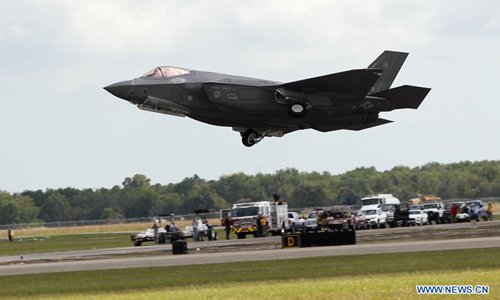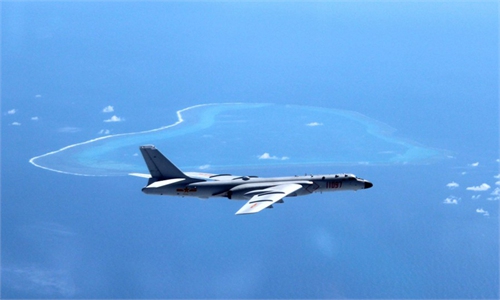US, Japan announce record defense budgets targeting China, unsettling analysts amid deteriorating security environment

An F-35 fighter jet performs during the annual Wings Over Houston Airshow at the Ellington Airport, state of Texas, the United States, Oct. 19, 2019. The annual airshow kicked off at the Ellington Airport Saturday, with aerial performances and displays. (Xinhua/Song Qiong)
After the US and Japan on Friday announced record defense budgets for 2024, with media reporting both have China in mind, experts warned on Sunday that under a deteriorating global security situation, the US is giving tacit permission to Japan to break away from its self-defense-only principle to help maintain the US' global hegemony amid dangerous rises in Japan's right-wing militaristic moves.
US President Joe Biden on Friday signed into law the fiscal 2024 National Defense Authorization Act, authorizing a record $886 billion in annual military spending, or about a 3 percent increase, and policies such as aid for Ukraine and a "push-back against China" in the Indo-Pacific, Reuters reported on the day.
Media on the island of Taiwan called the US defense bill "Taipei-friendly," as it reportedly requires the creation of a training program for the armed forces on the island and a status report on the delivery of weapons and services that the US has agreed to sell to the island.
Citing publicly available data, analysts noted that the US has been by far the world's top spender in military, with its annual defense expenditure higher than the figures of the second-ranking to 10th-ranking countries combined.
Even so, the US is continuing to expand its military spending to maintain its global military hegemony, including by pouring resources into hundreds of overseas military bases that support its military operations on other countries' doorstep, or worse, on their soil, a Chinese military expert who requested anonymity told the Global Times on Sunday.
In the Asia-Pacific region, the US frequently sends military aircraft and vessels to conduct close-in reconnaissance on China's coastal regions, makes transits in the sensitive Taiwan Straits, trespasses into waters off Chinese islands and reefs in the South China Sea and holds provocative exercises. In addition, it sells arms and provides military assistance to the island of Taiwan, seriously violating China's national sovereignty, security and development interests, the expert said.
But current conflicts elsewhere in the world including the Russian-Ukrainian conflict and the Palestinian-Israeli conflict have more or less hindered the US' strategy of focusing on containing China, as the US begins to run low on military resources despite its increasing defense budgets, the expert said.
The US will not give up its global military hegemony, so it has turned to its allies for support, even giving tacit permission to Japan to break away from its self-defense-only principle, observers said.
Just as the US announced its record annual military expenditure plan, Japan's cabinet on Friday also passed its record defense budget, a hefty 16 percent increase to $56 billion for the 2024 fiscal year, AP reported on Saturday.
The moves come as Japan "accelerates the deployment of long-range cruise missiles that can hit targets in China or North Korea while Japanese troops increasingly work with allies and take on more offensive roles," AP said.
It also eased Japan's postwar ban on lethal weapon exports, underscoring a shift away from the country's self-defense-only principle, with the Japanese government quickly approved to deliver US Patriot surface-to-air missiles produced in Japan under an American license back to the US to complement US stock, AP reported.
The easing of the ban would help strengthen Japan's defense industry and broaden the country's new official military aid designed for like-minded countries in the Indo-Pacific region in countering China, AP quoted experts as saying.
Japan has opened a Pandora's box, Song Zhongping, a Chinese military expert and TV commentator, told the Global Times, citing another recent Japanese arms transfer that saw the delivery of radar systems to the Philippines that is in an ongoing tension with China over islands and reefs in the South China Sea.
It is Japan's strategy to break away from its arms transfer ban, to contain China's development, and to coordinate with the US' Indo-Pacific strategy, Song said.
Japan's history of launching a war of aggression during World War II, when not only China, but also many other countries in the Asia-Pacific region including the US suffered, meaning that both the US and Japan should draw lessons from history and be cautious about the revival of Japanese right-wing militarism, experts said.




